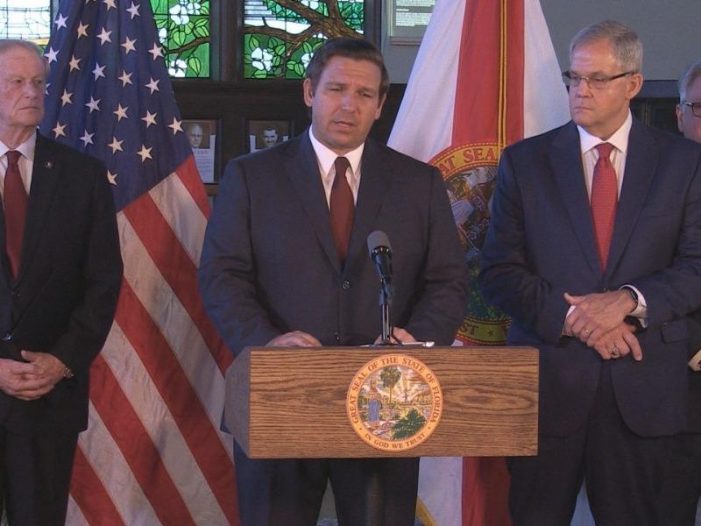By Ana Ceballos, The News Service of Florida
TALLAHASSEE — A campaign about free speech on Florida college campuses — a hot-button issue across the nation — is being backed by Gov. Ron DeSantis and public university presidents, who signed a resolution vowing to welcome all types of debate unless they promote “true threats or defamation.”
At the request of the governor, all 12 university presidents signed the resolution late last week. It says institutions will not “stifle the dissemination of any idea,” even when individuals find that speech to be “abhorrent.”
“It permits the freest expression of views before students, trusting to their good sense in passing judgment on those views. Only in this way can we best serve American democracy,” said John Thrasher, president of Florida State University, where DeSantis appeared Monday.
The resolution is similar to a policy passed by the University of Chicago. And while DeSantis and other supporters say they want to foster free speech, the governor said he does not believe Florida campuses have a problem with speech restrictions.
“I don’t think Florida has gone down that road,” the governor told reporters Monday. “I think we are showing that Florida welcomes debate and that the cure for an idea that you disagree with is to point out why that idea is wrong.”
The Foundation for Individual Rights in Education, a proponent of universities adopting free speech policies, has been critical of Florida State University in the past for banning Greek activities following the 2017 alcohol-related death of fraternity pledge Andrew Coffey. The criticism related to freedom of speech and freedom of assembly.
“The Florida State administration is taking the easy way out of a hard situation by issuing a blanket ban on Greek life, telling Greek students they can have their freedom back when they fix their culture,” according to an article posted by FIRE.
Florida campuses have a history of allowing controversial speakers. In October 2017, for example, Richard Spencer, a white nationalist, appeared at an event at the University of Florida, attracting scores of angry protesters.
DeSantis said the best response to controversial or offensive speakers, like Spencer, is giving them an “empty auditorium” because they “feed off ticking off people.”
He added, however, that “the most offensive speakers, to me, they are the easiest ones to combat because it’s very easy to point out why those views don’t really pass muster.” DeSantis, as an example, cited people who are opposed to vaccinations.
“To say you don’t need vaccinations, to me that is something being refuted by the facts,” DeSantis said. “This is not even close to being something that is indisputable.”
The governor’s push to foster free speech comes a year after former Gov. Rick Scott banned “free-speech” zones on campuses and as the Legislature considers a proposal that would mandate colleges and universities survey students and faculty on their viewpoints.
Supporters say the proposal would give state lawmakers an idea of whether there is ideological indoctrination on campuses. But it remains unclear what the Legislature would do once the data comes in.
When asked whether he supports the “intellectual diversity” survey, DeSantis said he is not familiar with the concept proposed by lawmakers. But he added that he thinks it is important to make sure institutions have faculty with diverse viewpoints.
“It is not about whether you are liberal or conservative, it’s about whether you are presenting education in a way that is going to challenge people to think critically about these different issues,” DeSantis said.
House Higher Education Appropriations Chairman Randy Fine, R-Palm Bay, told The News Service of Florida that while he has not talked to the governor about the bill (HB 839), he believes it is something that DeSantis would likely sign into law based on his stance on campus free speech.
Fine said there should not be a “bright line” drawn for what kind of speech should be barred, even when someone considers it to be hate speech.
“I hesitate to say hate speech because hate is in the eye of the beholder,” Fine said.
However, he said he would draw the line on speech that endangers others.
Under the resolution signed by the state university presidents last week, institutions “may restrict expression that is unlawful, such as true threats or defamation.” Each institution has also adopted regulations that are “narrowly drawn” and “content-neutral” to keep campus order and security.


Sad that a speech even has to be given about touting free speech.